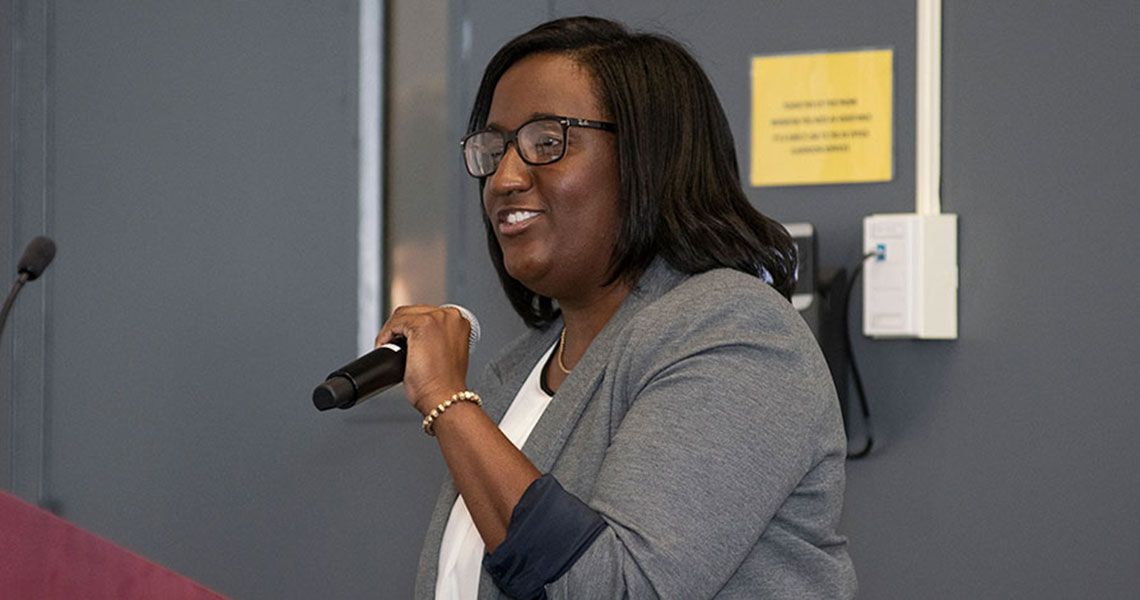Dipping one’s toes into the world of social media in a professional capacity can at times seem daunting, but it can also be incredibly helpful and rewarding, according to Hope Jackson, MD ’09, RESD ’16, assistant professor of surgery at the George Washington University School of Medicine and Health Sciences (SMHS).
Jackson shared her experiences navigating the digital age as a physician as part of the 8th Annual Frank N. Miller Lecture during the SMHS Reunion Weekend. The lecture is named for Frank N. Miller, MD ’48, BS ’43, a professor emeritus of pathology, a dean of students and curricular affairs, and a chair of the Department of Pathology at SMHS from 1944 to 1985.
Jackson noted that she was excited to be attending her first medical school reunion, and humbled by the chance to share her experiences with other alumni.
Her talk centered on using social media as a tool for collaboration, education, advocacy for various causes, and as an opportunity for professional development.
“[Social media] allows access to an even larger network of colleagues. A larger network that can lead you to a map of connections and opinions and experiences,” she said. “It has revolutionized how we communicate and how we socialize.”
Jackson talked about two main social media platforms, Facebook and Twitter, and how clinicians can use them effectively.
Private Facebook groups geared toward different specialties is one way to engage with others on the platform, Jackson said, citing a surgery group she’s a member of as an example. Members post cases to the group’s page, asking for advice on how to proceed and better help their patients.
Such groups create a forum for discussion, with the original poster adding photos and studies, while group members ask follow-up questions and post relevant journal articles and educational materials, turning Facebook into a real-time learning and collaborative tool, Jackson noted.
She added that while these tools can be incredibly beneficial, physicians also have to be careful and realize nothing online is ever truly private. Health care professionals must be careful to not divulge any identifiable private patient information, and should verify the legitimacy of any resources they share or are shared by colleagues.
She added that Twitter can be used both for educational opportunities and for advocacy purposes.
“Twitter has become a great medium for the everyday physician who is interested in education,” she said. “As the medical community has grown there, you can find more and more key teaching points you can access quickly.”
Jackson also has used Twitter for opportunities to advance professionally, including entering and winning a Twitter contest to attend a women in surgery conference.
“It’s a pretty great conference, and I got over my fear of social media and my imposter syndrome – I tweeted about why I want to go to the conference and then I reached out to my friends and I said ‘Hey, can you like this tweet?’ Seventeen retweets and 128 likes later I was the runaway champion,” she said.
She added that Twitter also is being used more for advocacy purposes, pointing to trending hashtags in the medical sphere like #ThisIsOurLane, which focused on gun control, and #ILookLikeASurgeon, which brought awareness to the implicit bias women and other underrepresented groups can experience in surgery.
“I hope we continue to study social media to learn the most effective ways to engage with each other and with our patients through these tools,” she said. “The best way is to just dive in and sign up. You don’t have to post right away, just explore and see how you want to interact and how it can be a useful tool in your own work.”



